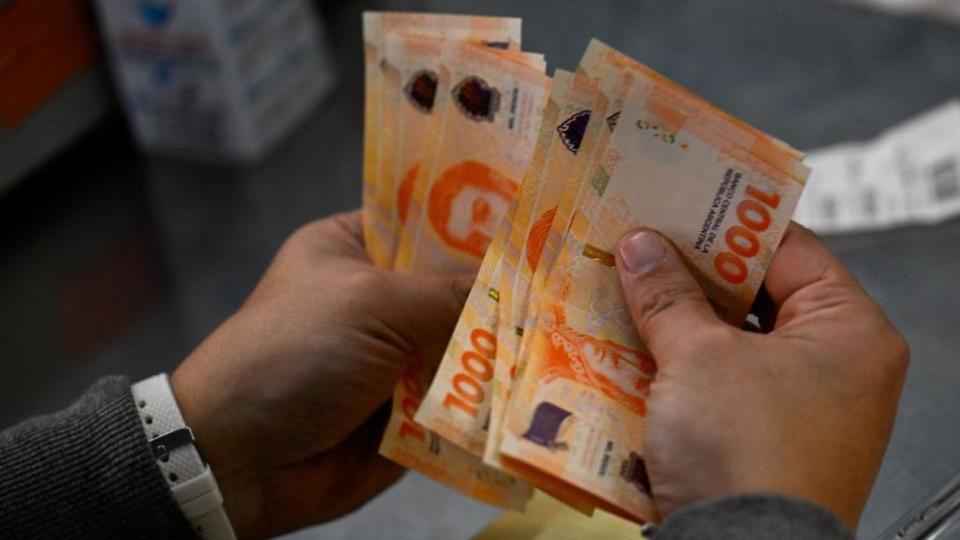When Javier Milei was campaigning last year to become president of Argentina, he brandished a chainsaw to symbolize his determination to substantially cut public spending.
Now, six months into his right-wing presidency, how is his shock therapy working for both the government and the country’s economy?
“The changes that our country needs are drastic,” said Milei shortly after being elected. “There is no room for gradualism.”
And he certainly acted quickly. In his initial package of measures, he devalued the Argentine currency, the peso, by 50%, reduced state fuel subsidies and halved the number of government ministries.
The rapid reduction in public spending helped Argentina emerge from a fiscal deficit – the difference between government spending and revenue – of 2 trillion pesos ($120 billion; £93 billion) in December last year for a surplus of 264.9 billion pesos in April.
Argentina also reported a surplus in January, February and March, marking the first time it reached this monthly target since 2012.
However, Milei, who describes himself as a libertarian, has made cutting inflation his top priority, telling the BBC last year that it was “the most regressive tax that hurts people the most”.
Inflation slowed down – in April, the monthly rate fell to 8.8%, the first time since October that it did not reach double digits. This measure of inflation is closely followed in countries like Argentina, which have long had high inflation.
However, when it comes to the annual inflation rate, most recognized globally, it reached 289.4% in April. To put this into perspective, in the UK the annual rate is currently just 2.3%.
And although official growth figures are not yet available for the period since Milei took office on December 10, there is evidence that the Argentine economy has contracted sharply, with consumer spending falling in the first three months of this year.


However, other promises made by Milei during the campaign, such as the replacement of the peso with the US dollar and the abolition of the central bank, have recently taken a backseat.
The problem for President Milei is that his coalition La Libertad Avanza (in English – Freedom Advances) does not hold a majority in the Argentine Congress. And he has had difficulty closing agreements between parties.
Milei wants Congress to grant him the power to privatize more than two dozen state-owned companies, including the state-owned airline, railways, post office and the national water supplier.
His initial “omnibus” bill, containing privatization plans and hundreds of other economic measures, failed to pass a second reading in February. A simplified version, reintroduced to Congress in April, was approved in the Chamber, but has not yet been approved by the Senate.
The president also faces strong opposition from unions, who have taken to the streets in protest, saying workers’ rights will suffer from widespread deregulation of the economy.
Juan Cruz Díaz, managing director of Argentina-based geopolitical risk consultancy Cefeidas Group, says Milei’s economic policies in office are as radical as those promised during the campaign, just a little delayed.
“His administration was forced to slow down these reforms, given the political and social obstacles it faced,” says Díaz.
He adds that the specific factors that lead the president to act cautiously are “the deterioration of people’s purchasing power and the fear of greater social unrest”.
This is because there has been no decrease in the number of people living in poverty, which has increased from around a quarter of the population in 2017 to more than half now.
However, the International Monetary Fund, which over the decades has lent more money to Argentina than any other country, gave the government high marks in May, saying its performance was “better than expected” and that its economic program was “firmly back”. on the right path.”
Regarding the question of whether President Milei can get more policies agreed upon by parliament, Mr. Díaz says that, although some sectors of the opposition are open to dialogue with the government, left-leaning parties are completely opposed to his agenda. These include the Peronist faction controlled by former president Cristina Fernández de Kirchner.
“In this context, the government’s ability to negotiate and build consensus is tested daily, a test that Milei himself often makes difficult with certain explosions and unnecessary confrontational statements,” says Díaz.
In fact, many Argentines consider Milei’s enthusiastic personality more of a hindrance than a help.
In its latest survey, political consultancy Zuban Córdoba found that 54% of respondents thought the president was paying more attention to his international political image than solving Argentina’s problems.
This perception was undoubtedly reinforced by Argentina’s current diplomatic dispute with Spain, which led Madrid to recall its ambassador to Buenos Aires.


Kimberley Sperrfechter, an emerging markets economist at the research group Capital Economics, says President Milei’s central problem is that he has to overcome “years and years of economic mismanagement” in Argentina.
“A key factor is that the government has spent far beyond its means [for decades]”, she says. “And this deficit was financed by the central bank printing money to finance government spending.”
This impression helped cause inflation to rise in the country.
Argentina, the eighth largest country in the world, has actually been in decline for more than a century. Its fall serves as a warning about how a nation’s wealth can be wasted.
Before World War I, it was ranked as one of the 10 richest countries in the world.
But the subsequent slow economic contraction was substantially accelerated by the populist policies – and excessive spending – of President Juan Perón, who was in power from 1946 to 1955.
There were some short-lived free market reforms in the 1990s under the government of President Carlos Menem, who privatized many of the companies that Perón nationalized and made serious attempts to restore faith in the Argentine currency.
But things took a sharp turn for the worse in late 2001, when the country suffered a catastrophic economic collapse and a massive $102 billion (£80 billion) debt default.
Argentina had essentially locked itself into a monetary regime that did not give it flexibility, by setting the peso at par with the dollar. This, along with the government’s usual excessive spending, exposed it to the ups and downs of the US economy and left it powerless when a run on Argentine banks ensued in 2001.
In the two decades following that crisis, the country was governed mostly by left-wing protectionists, who basically survived without solving Argentina’s deep-rooted problems.
Now, with a right-wing libertarian administration in power, the country is trying to chart a new course – and that means putting the government’s finances on a solid footing.
To help President Milei’s government achieve this goal, research firm Consensus Economics says the administration is focusing on Argentina’s vast agricultural exports of cereals, soybeans, meat and wine.
“Policymakers are pinning their hopes on agricultural exports that bring in badly needed foreign exchange, while hoping to boost depleted central bank capacity. [foreign exchange] reserves and, in turn, increase the state’s financial credibility”, says Consensus.


However, Sperrfechter considers that the Argentine economy is currently at a “turning point” and that Milei cannot count on public support, despite his electoral victory.
“It’s not that people were convinced by his policies, it was more of a protest vote,” she says. “Things couldn’t continue as they were.”
Sperrfechter considers that, despite the devaluation of the peso, the currency remains overvalued, possibly by up to 30%. The exchange rate is still being managed rather than being completely free to move up or down, she says, and this is holding back growth and harming competitiveness.
“With Argentina you never know, but I think the shine is fading,” says Sperrfechter. “Optimism will disappear and the economy will struggle.”








/cdn.vox-cdn.com/uploads/chorus_asset/file/25521968/Affinity_six_month_free_trial.jpg?w=300&resize=300,300&ssl=1)


















/cdn.vox-cdn.com/uploads/chorus_asset/file/25515007/VST_0702_Site.jpg?w=300&resize=300,300&ssl=1)










/cdn.vox-cdn.com/uploads/chorus_asset/file/25357647/STK264_MICROSOFT_TEAMS_V2_CVIRGINIA_A.png?w=150&resize=150,150&ssl=1)